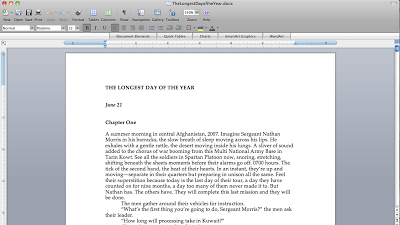Ritual Re-Reading
 |
| Going back to good ol’ PAGE ONE! |
When I coach myself through writing and revising new material, and when I coach my students, the mantra is the same: read your work out loud. Then read it again. Then read it some more. The act of re-reading has become such a ritual to me, it is inseparable from the act of generating new material. I am constantly sounding sentences out loud in my mind’s ear, then testing them audibly as soon as I hit period to end the sentence.
This weekend, I reached an important juncture in drafting the novel. Sure, it’s still a little pea at just 60 pages so far, but milestones are hard to come by in the novel-drafting business, so I’ll take what I can get. I spent the first 4 chapters focusing on the American Sergeant and his platoon. Chapters 5-7 (an almost equal number of pages as the first four chapters) introduced the Afghan couple residing in the town that the Americans are headed toward. Those chapters also, in two brief scenes, introduce an unnamed orphan boy who will later play a key role in bringing the Sergeant and the couple together in the novel.
Deep breath.
Rather than forge ahead into Chapter 8 (which I know will zero back in on the Sergeant, though I don’t know in exactly what way), I took the time to read all sixty pages out loud from start to finish. Thanksgiving weekend festivities rattled on, with my wonderful cousins and relatives filling the house with sounds, both electronic and organic. I participated most of the time. But for several hours each day, I withdrew to a quiet corner (lucky me–I know most family weekends don’t afford this luxury) in order to read out loud to myself.
By doing this, I was able to confirm one of my suspicions–that the pacing for the Sergeant’s sections of the novel is noticably different than the pacing for the Afghan couple. So far, I think that difference will diversify the reader’s experience in a valuable way. I also think the varied pacing matches the varied content, by which I mean that the Sergeant is rolling forward in a convoy and, therefore, his narrative rolls forward with a rather insistent pace. The Afghan couple, however, is biding its time in a tiny bubble of uncertainty. Their narratives are layered and slow, moving between flashback and present moment or summary and scene, even indulging in occasional italicized interior monologue or dubbing.
Here’s an example of such an indulgence. (And yes, to all my students out there, it’s full of killer fillers and killer be’s…many of my early drafts are.) Who knows if this will make the final cut, but notice the freedom that this slower pace gives me to play around with point of view, time, and memory:
Aaseya lay awake on her back, burning with the foolishness of her inquiry. How dare she be so meddling, so concerned in the affairs of her husband? She had wanted to ask if he would purchase the paper for her, but to exert her will now seemed a risk too great. Rahim would not oblige. She was fortunate not to have been slapped.
That’s not the first time you escaped a scolding. Your petty dreams when the small school for girls opened and you and your sisters walked freely into the classroom. Six months and already, you imagined yourself an educated woman. The American aid teacher called you up to the blackboard for simple translations and that’s when they came, the soldiers clad in everyday clothes, carrying guns. You squeezed the piece of chalk in your hands until it broke in two and all you wanted to do was hide it from your teacher. That chalk was so expensive, so difficult to come by. The soldiers shouted and the teacher put herself between you and them. One of them struck her across the face with his gun, her headscarf falling to the floor, revealing blond hair that ignited the room like an insult. He pressed your teacher into the blackboard and you behind her, sandwiched against the wall. Then he did something with his hands, but you could only smell your teacher, the way your face pressed sideways into the small of her back and you hadn’t smelled real laundry detergent before but that must be what Western women do. She smells like flowers, even when this man is doing something and you can feel your teacher’s knees begin to buckle, she smells like flowers.
Phew. Even if I don’t get to keep it, it was an important thing to write. Now I know my character is highly attuned to scents, to early childhood confusions, to private scoldings no matter how undeserved. And I also know, from reading and re-reading out loud, that passages such as this one that “break” the point of view and the chronology are “ok” in the bigger picture. Reading things out loud, the before and after from this page still made sense to me, and hopefully it would to others as well.
At the start of this new week, there are a lot of tasks ahead of me–the writing business, extra waitressing shifts, volunteering on trail crews. But I have a direction. I have confidence. One page at a time, I can keep writing and re-reading.

